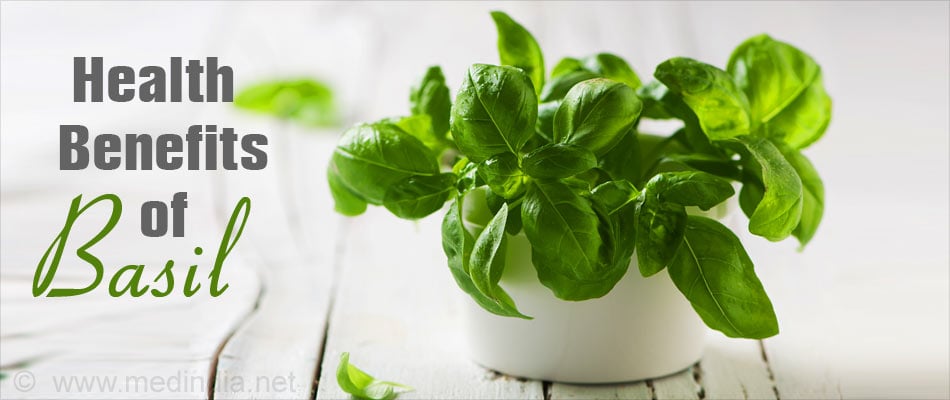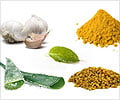What is Basil?
Basil (Ocimum basilicum), also known as Saint Joseph's Wort, is a culinary herb belonging to the mint family- Lamiaceae.
A native to tropical Asia and the Middle East, basil leaves are used extensively in Italian, Thai, Vietnamese, Mediterranean and Indonesian cuisine.

The flavonoid and essential oil content add to its myriad health benefits, making it one of the healthiest herbs. Derived from the Greek word, “basilikohn," meaning royal, basil is aptly named Royal Herb and King of Herbs. More than 60 varieties of basil leaves have been identified, each offering a subtle difference in smell and taste.
Cinnamon basil, lime basil, thai basil, purple ruffles and holy basil are some popular basil variants.
The addition of basil leaves ups the flavor and nutritional profile of soups, sandwiches and salads significantly. Since the nutrients, flavor and volatile oils in dried basil are relatively low, it is advisable to use fresh basil leaves.
Health Benefits of Basil
Basil benefits our overall health in multitudinous ways – improving cardiovascular health, promoting healthy vision, relieving stress and boosting immunity.
For Heart Health
Basil is a blend of two heart-friendly nutrients – beta-carotene and magnesium. Beta-carotene prevents free radicals from oxidizing cholesterol in the blood stream which may otherwise lead to atherosclerosis and heart attacks.
Magnesium plays a vital role in the relaxation of blood vessels, ensuring smooth blood flow and lowering the risk of irregular heart rhythms.

Basil contains cinnamic acid which improves overall blood circulation. It also contains eugenol, which keeps blood pressure and cholesterol levels in check.
Enhances Cognitive Function
Basil is an excellent source of brain-boosting nutrients – magnesium and flavonoids. Magnesium improves memory and learning skills whereas flavonoids are associated with higher scores on cognitive tests.
Basil herb also decreases the level of stress hormones, particularly corticosterone. Lower levels of corticosterone result in improved memory and mental clarity as well as the risk of age-related mental disorders.
Anti-bacterial and Anti-inflammatory Effect of Basil Leaves
Basil leaves contain essential oils such as eugenol, citronellol, linalool, citral, limonene and terpineol which possess anti-inflammatory and anti-bacterial properties.
Basil contains compounds like linalool, methyl chavicol and methyl cinnamate which inhibit the growth of disease-causing bacteria such as Staphylococcus aureus, Streptococcus faecalis, Escherichia coli, Shigella, Salmonella species, Mycobacterium species and Pseudomonas aeruginosa which may otherwise result in illnesses like food poisoning, urinary tract infections, pneumonia and dysentery.
Basil leaves possess antitussive (suppresses the cough center) and expectorant properties (helps expel phlegm from the chest) which make it an ideal remedy for coughs, cold, sore throat and other respiratory disorders including chronic and acute bronchitis. A study published in the journal Food Microbiology demonstrated that essential oils in basil retard the growth of antibiotic-resistant bacteria.
Eugenol inhibits the action of enzyme cycloxygenase (COX), which causes inflammation, making it an important remedy for inflammatory health conditions like rheumatoid arthritis, osteoarthritis and inflammatory bowel conditions.
Eugenol mimics the action of over-the-counter anti-inflammatory medications like ibuprofen and acetaminophen.
Healthy Hair and Youthful Skin
Due to its anti-fungal properties, basil leaves help in treating scalp irritations, itchiness, flaking and dandruff as well as remove impurities and dead cells accumulated on the scalp.

Basil promotes hair growth by stimulating the hair follicles. It also reduces hair fall by improving blood circulation and supplying essential nutrients which improve the strength of hair shafts. Basil leaves function as an excellent skin rejuvenator and purifier warding off skin diseases and providing clear, glowing and younger looking skin.
Being an abundant source of flavonoids and antioxidants, basil works wonders as an anti-aging agent. It prevents the appearance of wrinkles, age spots and fine lines. A concoction of basil leaves along with lemon juice work as an excellent skin toner.
Topical application of a paste of basil leaves along with sandalwood paste or rose water prevent the outburst of pimples and acne.
Helps Fight Age-Related Macular Degeneration
Age-related macular degeneration is caused by deterioration of the macula which is the central portion of the retina.
According to the data collected by the Nurses’ Health Study and Health Professionals Follow-up Study in the United States, eating foods rich in zeaxanthin and lutein lowers the risk of age-related macular degeneration by 40 percent.
Basil is a rich source of beta carotene, cryptoxanthin, lutein and zeaxanthin which act as protective scavengers against free radicals and reactive oxygen species (ROS) as well as promote eye health. About 100 grams of fresh basil leaves provide 3142 mcg of beta carotene. Thus, regular intake of basil leaves slows down age-related macular degeneration.
Kidney Health
Basil leaves act as a kidney tonic by cleansing the kidneys and lowering uric acid levels, which is the root cause of kidney stones. Basil contains compounds like acetic acid which help in the expulsion of kidney stones via urine.
A concoction of 1 teaspoon of basil juice along with honey taken on a daily basis for 6 months is considered as one of the easiest and most effective remedy for kidney stones. Being a diuretic, basil also keeps urination problems at bay.

Benefits Diabetics
Basil extracts are used in the treatment of type 2 diabetes. Basil leaves are packed with essential oils like eugenol, methyl eugenol and caryophyllene which help the pancreatic beta cells (i.e. cells that store and release insulin) function properly. As a result, it increases sensitivity to insulin which helps lower blood sugar levels, thus treating diabetes effectively.
Basil Recipes
Tomato, Basil and Spinach Soup:
Ingredients:
- 2 tablespoons butter
- 1 large chopped onion
- 1 teaspoon minced garlic
- 1 ½ cups milk
- 1 ounce tomato puree
- 1 tablespoon sugar
- 2 cups chopped spinach leaves
- ¼ cup chopped basil leaves
- ½ teaspoon salt
- ¼ teaspoon black pepper
- 1 tablespoon grated parmesan cheese
Method:
- Melt butter in a saucepan and saute onion and garlic for about 3 minutes.
- Add milk and cook for 2 minutes, stirring occasionally.
- Mix in the tomato puree and sugar and bring to boil over high heat. Simmer and keep it.
- Add spinach, basil, salt and pepper and cook for 2 minutes, stirring occasionally.
- Garnish with parmesan cheese. Serve hot.
How to Store Basil
For short-term storage, keep fresh basil leaves in a glass of water on the kitchen counter. Change water in the glass on a daily basis. This method will retain the fresh flavor for up to 10 days.
For long-term storage, puree fresh basil leaves in a blender. Fill ice cube trays with the puree and freeze. Once the cubes are frozen, transfer the basil pops in a zip-lock freezer bag and use as required.








